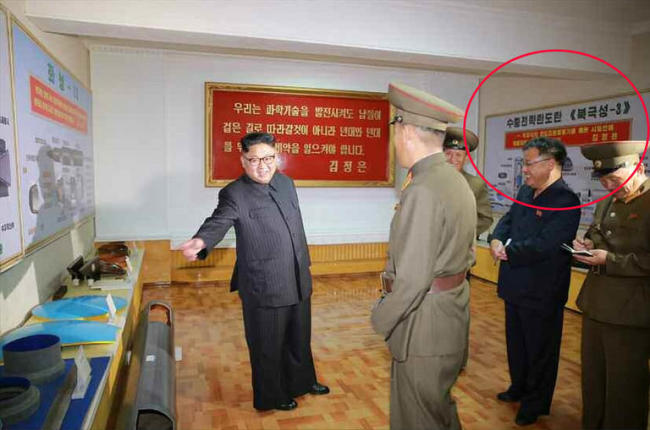[Newsmaker] Is NK ‘laying low’ for another missile test?
By Jung Min-kyungPublished : Nov. 14, 2017 - 18:02
North Korea has taken a break from military provocations, not firing anything into the air nor detonating underground munitions for two months, but signs pointing to further development of its weapons program lurk beneath the calm surface.

Pyongyang has halted its nuclear and missile experiments since Sept. 15, which has fueled hopes of the US and South Korea establishing a dialogue channel with the North.
But top diplomats here are cautious on viewing the current hiatus as North’s willingness to talk, citing its reluctance to abandon its nuclear and missile development program.
Foreign Minister Kang Kyung-wha said although she welcomes the pause in the North’s provocations, it is crucial for Pyongyang to step up and display “a clear sign of change of course,” in an interview with Bloomberg on the sidelines of the Asia-Pacific Economic Cooperation Forum in Danang, Vietnam.
“We very much hope there will come a point when we have North Korea at the table discussing denuclearization,” Kang said.
“But before we can do that they need to continue to not provoke and we have seen that for the past two months. We need a clear sign of a change of course from North Korea,” she said.
Kang previously acknowledged that the North’s weapons program is just mere months away from completion and the next provocation can come “at any time,” in a separate interview in October.
During what the outside world sees as a two-month hiatus, Pyongyang may have been focusing on the technological upgrades of its missiles, media reports have suggested.
Japan’s Asahi Shimbun daily reported Sunday that Pyongyang has conducted a series of combustion experiments for a new solid-fueled missile engine, citing military sources. The tests may have been for an upgraded version of a ground-to-ground medium- to long-range Pukguksong-2 ballistic missile or a new submarine-launched ballistic missile, it said.
It added the next military provocation may come around Dec. 1, when the North Korean military kicks off its winter training exercise.
The Diplomat said the isolated nation conducted a test of a new solid fuel rocket engine at its key engine test facility sometime between Oct. 15 and 21. Recent commercial satellite imagery from mid-September to mid-October portrays activity at the site that may indicate such experiments, an analysis by 38 North of the US-Korea Institute at Johns Hopkins School of Advanced International Studies showed.
Experts here say the North is currently taking time to assess the situation before making its next move, although it is difficult to ascertain its exact intentions.
“North Korea’s weapons program is near completion and its regime is aware that (the program) can act as a game-changer in the current situation,” Koh Yu-hwan, a professor at Dongguk University in Seoul, said.
North Korea’s Foreign Ministry has stressed that the major goal of its weapons development is to achieve a “balance of power” with the US. Its latest provocation involved an intermediate-range missile that flew over Japan’s northern island of Hokkaido, showcasing it’s capability to strike the US island of Guam.
“The US is also sending messages to the regime by hinting at possible talks once it meets a 60-day no-launches, no-tests requirement. Pyongyang will keep tabs on the situation before making a relevant announcement or provocations,” Koh said.
The top US envoy on North Korea, Joseph Yun reportedly told the US Council on Foreign Relations that if North Korea halts such experiments for around 60 days, it would be a signal indicating the need to resume direct talks with Pyongyang.
Pyongyang on Monday pledged to continue its pursuit of nuclear missiles in a letter addressed to UN Secretary-General Antonio Guterres, amid South Korea and the US’ four-day joint naval drill in the waters near the Korean Peninsula where the US made the rare move to deploy three aircraft carrier groups here.
By Jung Min-kyung (mkjung@heraldcorp.com)

















![[KH Explains] Hyundai's full hybrid edge to pay off amid slow transition to pure EVs](http://res.heraldm.com/phpwas/restmb_idxmake.php?idx=652&simg=/content/image/2024/04/18/20240418050645_0.jpg&u=20240418181020)

![[Today’s K-pop] Zico drops snippet of collaboration with Jennie](http://res.heraldm.com/phpwas/restmb_idxmake.php?idx=642&simg=/content/image/2024/04/18/20240418050702_0.jpg&u=)